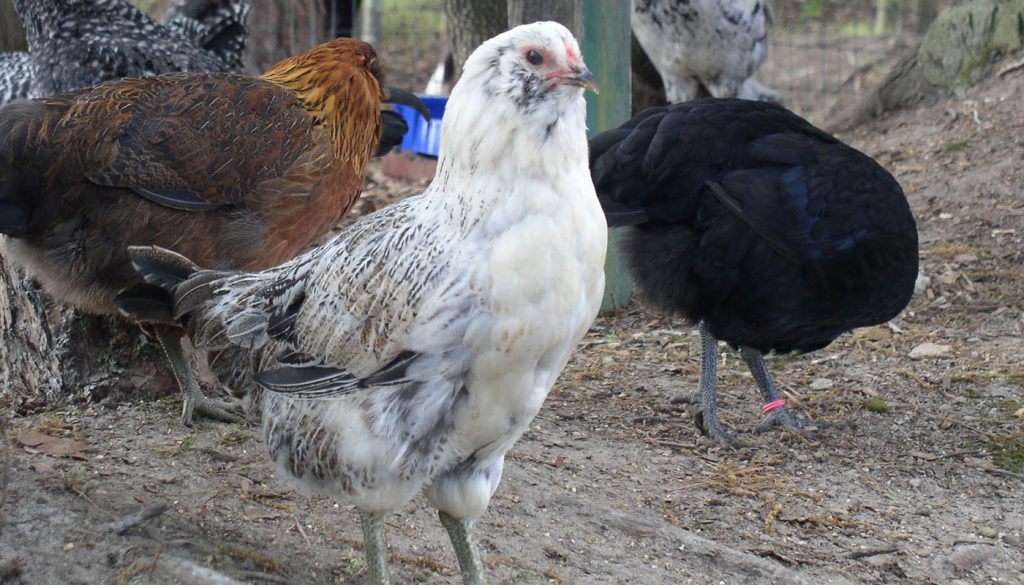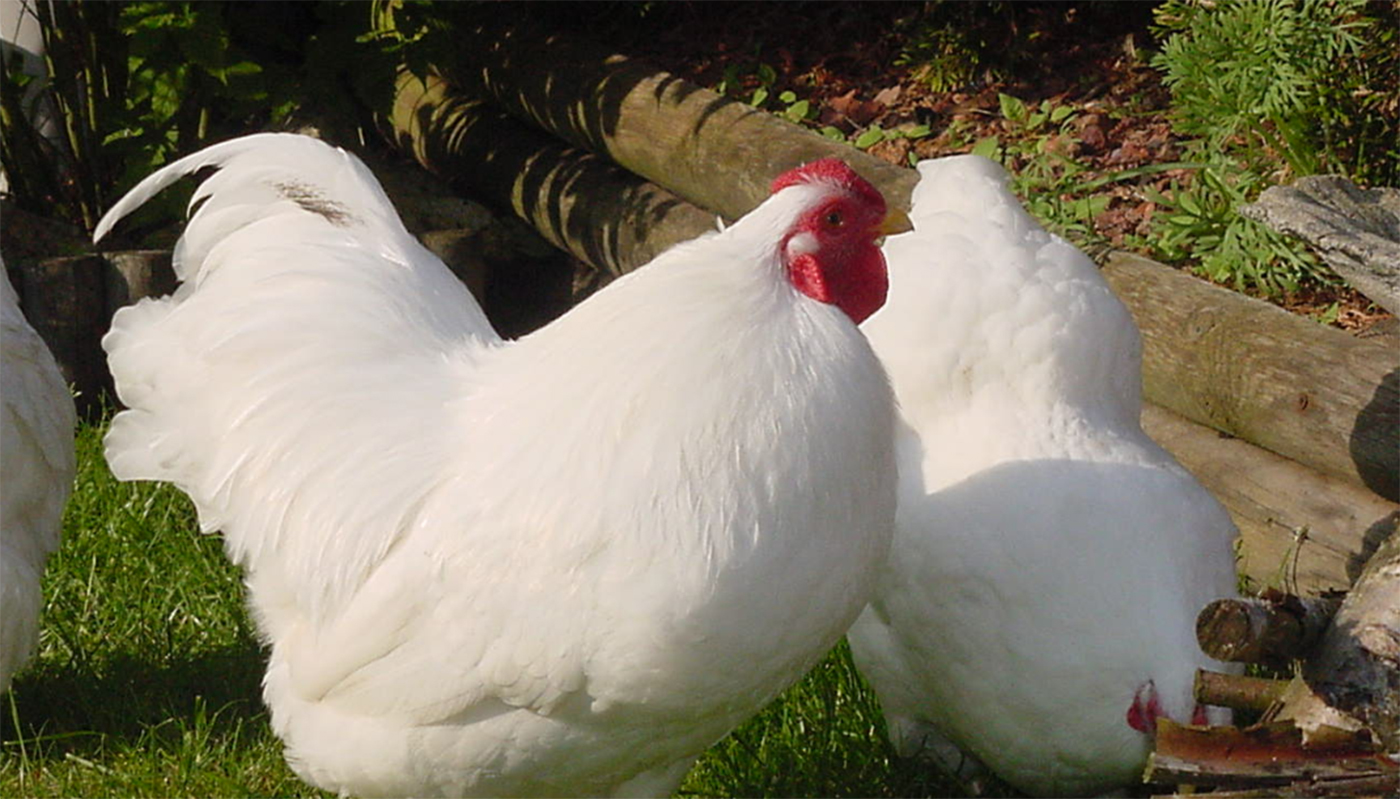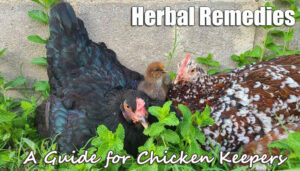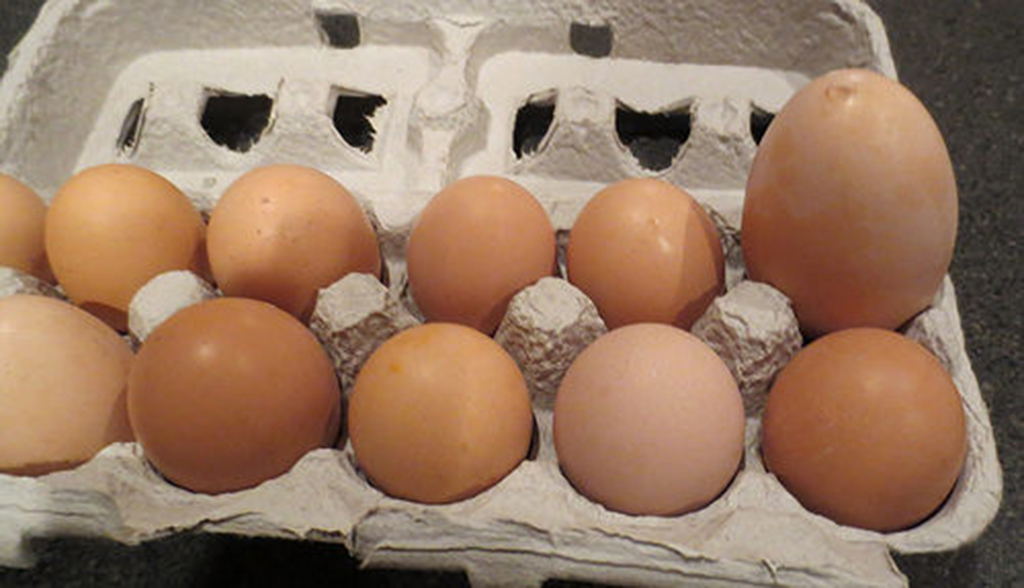
The Ameraucana is a breed that originated in America where it was developed from the Araucana. They lay blue eggs, have ear muffs, a beard and pretty slate blue legs and do not have the same breeding problems that are associated with the Araucana’s. They are not as rare as the Araucana’s, but you will probably only get these chickens from a registered breeder. These are one of the friendliest breeds of chickens but if you are going to buy the Ameraucana to add to your flock, breed or show your bird make sure you have bought it from a reputed breeder and that is not an Easter Egger. A lot of places that sell chickens tend to mislabel Easter Eggers as Ameraucana. Some places will misspell this birds name as Americana or Americauna. Some dealers will even try and misleadingly call their Easter Eggers either of these misspelt names.
| Country of Origin: | America |
| American Poultry Association: | Recognized as a breed of chicken in the United States |
| Chicken Category: | Standard Breed |
| Chicken Class: | Miscellaneous |
| Bantam Variety Available? | Yes – All Other Comb Clean Legged Bantam Classification |
| Good Starter Chicken? | They are a hardy chicken but are not too common so do need some special attention. But could make for a good started chicken for those looking to breed or show their birds. |
IDENTIFICATION⇒ |
Appearance/Body: They are distinguished looking birds sporting a beard, muffs, tail feathers with small earlobes and wattles. The wattles and combs are red.
They have clean slate blue (or black in the black color birds) legs.
Color(s) Both the hens and roosters come in eight different color variations. These colors are Blue Wheaten, Brown Red, Buff, Silver, Wheaten and White, Blue and Black.
Comb: They have a pea comb
Ave. Weight: Hens/Pullet 4.5 to 5.5. lbs. Cockerel 5.5 to 6.5 lbs. |
PURPOSE⇒ |
Eggs: They are good egg layers.
They lay medium sized blue eggs up to 280 per year They are steady layers, laying consistently all year around. They start to lay eggs from 6 months old.
Meat: They are not very meaty birds and tend to taste a bit like quail or pheasant.
Breeding: They can be bred and they hens do get broody and make very good mothers.
If you are breeding the Ameraucana it is important to breed birds of the same color. It is also important to be sure you have good bloodlines for breeding. For advice on breeding please check our guide to breeding poultry. If you are a first-time breeder especially for the Ameraucana being quite rare it is best to seek advice from an Ameraucana breeder.
Foraging: Although they do tend to like keeping close to their coop or the house they do still like to forage and scratch about.
Show Bird: As they are not a too common a bird they make good show birds.
Pets: They are one of the best birds to keep as a pet.
Other: These lovely docile birds love to have fun with their humans. They will happily follow their humans around the garden. They may even become the dogs best friend and groom them off pesky pests.
They will give your organic garden a lot of nutritious fertilizer to ensure great blooms and tasty vegetables. |
HISTORY
The Araucana chicken was brought to America from Chile. This bird carried an unusual blue-egg gene and was rumpless, tufted breed that was known to have lethal alleles. The Ameraucana was developed from the Araucana in the 1970’s to retain the blue-egg gene but illuminate the lethal alleles. The Ameraucana also has a beard, muffs instead of tufts and usually have tails.
The Ameraucana became recognized as a standard of perfection by the American Poultry Association in 1984 as a breed apart from the Araucana.
The name Ameraucana is derived from Araucana and American. In countries such as the United Kingdom and Australia they usually considered the Araucana and Ameraucana as a single breed.
CHARACTERISTICS |
|
|---|---|
| Life Expectancy: | The average lifespan is 10 years but can live for up to 12 years. |
| Health: | The Ameraucana does not have any health issues and does not tend to get frostbite. They weather the winter months well but do not do too well in extreme heat. |
| Temperament: | They are wonderful fun-loving, inquisitive and docile pets. |
| Flyers? | They can be quite flighty, so the run should be covered and it is best to maybe clip their wing to stop them from visiting your neighbors. |
| Noisy Birds? | They are relatively quiet calm birds. |
| Interaction with other chickens: | They are quite mature birds and tend to get along with most other breeds. As with any flock if you are introducing new birds it is best to slowly socialize them with the flock. |
| Good with kids? | They are really good with children. They love to have fun and will happily chase the kids around the garden. Their curious nature will have them exploring and digging in the garden with the kids. |
| Socialize Behavior? | They get along well with all other animals but can be a bit shy of them. |
| Known predators: | Most domestic animals leave them alone, but it is always best to keep an eye on dogs and cats. If hawks and or foxes are in your area it is always best to take precautions. Check with local animal shelters, zoos, vets, animal control and or pet stores about common predators in your area. |
| Conservation Status: | Although these birds are rare their conservation status is recorded as not listed. If you are going to show or breed them It is best to check on any special license or instructions that may be set up for owning these birds. Should you wish to check the conservation status of any Chicken breed this can be done by checking with local or national conservation centers. |
IDEAL ENVIRONMENT |
|
|---|---|
| Garden Size: | These adorable chickens will adapt to most garden sizes and can do well in confinements. They do love to stretch their legs and roam about the garden from time to time. |
| Ideal Climate: | They do not mind the cold as they are a hardy bird not too prone to frostbite. They are okay in the summer months but may need extra attention in extreme heat. |
| Ideal Coop: | The rule of thumb for any coop is 50 cm x 50 cm per hen/rooster in the coop. Ensure there is a good space for the nesting boxes and nightly roosting rails at least 1.5 inches wide. Good ventilation for air but not too drafty especially in winter. It is always a good idea to raise the coop off the ground to give the birds a dry place to roost and lay especially in wet weather. |
| Ideal Coop Run: | As they do like to fly the run should be completely covered. |
| Ideal Flock Size: | They are a sociable chicken and do like to have a friend or two in the flock. They do not mind other breeds and mix well. |
| Special Instructions: | Not having too many health issues they do not require any special grooming or treatment. It is always best to check for the usual pests that may trouble any domestic animal such as worms, mites, fleas, etc. |
| Accessories: | The following accessories are ideal for your coop: Nesting boxes Straw for the boxes and roosting area Roosting rails Perches Water troughs/bowls Food bowls/feeders Heating lamp(s) Animal carrier for transport purposes |
| You may Also Like: | 45 FREE DIY CHICKEN COOP PLANS, TUTORIALS AND DESIGNS |
WHERE TO BUY THEM |
|
|---|---|
| Live Poultry Outlets: | The Ameraucana is a pure breed chicken and not that common. To ensure you are getting a purebred Ameraucana and not an Easter Egger it is always best to buy these beautiful birds from a registered breeder. |
| Internet Poultry Websites: | There are a few reputed live poultry dealers that sell Ameraucana but be sure to check they are the true breed especially if breeding or showing is a prime purpose in owning the bird(s). |
| Organizations: | American Poultry Association will have some extra advice on registered breeders that may be in or around your area in the USA. American Livestock Conservancy does keep some registered breeders for various breeds. If they do not have anything listed for the Ameraucana if you email or call them they should be able to point you in the right direction. |
| Breeders Clubs: | The Ameraucana Breeders Club has a comprehensive breeders directory and a lot of useful information about the breed. |
| Other: | The organizations and or breeders listed above may also have a host of valuable information about your chickens. They will also be able to provide you with any special instructions, problems, etc. about your chickens. |
CARING FOR THE BIRD(S)
Please click here for our full guide to “Taking care of chickens”. This is a comprehensive guide to owning chickens. It covers where to start from choosing your ideal flock, the coop that would best suit your garden, your bird and you to buying and bringing your bird(s) home.
GENERAL
Ameraucana makes a great family pet that will give you fresh nutritious eggs nearly every day. They do not need any special attention or care as they are quite hardy low maintenance birds. As with any pet they love some of your attention and time every day!
GROOMING
Make sure they are de-wormed and checked for other critters such as lice, mites, fleas and ticks on a regular basis. A nice dust bath filled with a bit of lavender or such will be highly appreciated by your flock as they do love to take these baths. A nice sandy bath makes for a much cleaner chicken as it helps to rid them of pests and excess oils.
DIET AND NUTRITION
Ameraucana will forage about, scratching up pesky weeds and hooking worms out the soil. They will wander through the plants and grass eating various insets or other pests that can plague a garden. Various table scraps and iced fruit/vegetable cubes in the summer are a welcome treat to your birds. Chicken pellets, grains, chicken mash or grain mix makes for their regular daily feed from the ages of 8 weeks old and older.
Chick Starter is the best to feed the chicks that are under 8 weeks old.
Laying hens should get extra protein and calcium in their diets to ensure the quality and nutrition of their eggs as well as keep your hens healthy.
Please see our comprehensive guide to “Feeding your chickens” for more information of the different types of chicken feed for chicks, hens, laying hens, roosters, etc. and where to buy the feed from.
SOCIALIZING THE BIRD(S)
The Ameraucana is a docile, calm and friendly bird with the sweetest nature. They love to nurture and mother chicks. They tend to socialize well with most other breeds and are not an aggressive or loud bird, so they tend not to cause too much friction. They may be bullied by more aggressive chickens, so it is best to keep an eye on any breeds with a more assertive nature.
Always check on how well a breed will get on with your current flock before buying them as you do not want to stress out your established flock.
If you are planning to keep different breeds, try getting breeds with a similar nature.
As with any newcomer to the roost, you will have to quarantine the bird for 7 – 31 days to ensure it does not have any unwanted critters or disease that could spread to your current flock.
Even though they are friendly sociable birds there is always a pecking order to which the new birds will have to conform.
NOTES / SPECIAL INSTRUCTIONS
These are hardy low maintenance birds that do not require special attention if being kept as a pet or as part of your laying flock. If breeding or showing the birds is part of the plan for keeping them it is important to ensure the bird is a true Ameraucana from a registered breeder.
For breeders, it is imperative that you always check your bird’s bloodlines and ensure you are buying your birds from a reputed breeder/farm. In order to sell birds of such stature, they have to be recorded and documented, always check with local animal breeding organizations for these records.
These legitimate documents are also required should you wish to show your bird(s) in various poultry shows/competition showings.
For information and advice on adopting rescued animals, you can visit or contact your local animal welfare center.
Video
USEFUL LINKS
- Caring for your Chicken
- Feeding
- Health
- Socializing your Chicken
- Breeding Chicken
- Raising Chickens A-Z
- Hatching Eggs
- What is Molting
- Animal Shelter (ASPCA)
- American Veterinary Medical Association
- American Poultry Association
- American Animal Welfare Society
- American Animal Control
- American Animal Husbandry Society
References
- https://en.wikipedia.org
- https://livestockconservancy.org
- https://www.roysfarm.com
- https://www.mypetchicken.com
- https://www.backyardchickens.com
- https://www.feathersite.com/
 Cubalaya Chicken Breed – Everything You Need to Know
Cubalaya Chicken Breed – Everything You Need to Know American Game Fowl Chicken Breed – Everything You Need to Know
American Game Fowl Chicken Breed – Everything You Need to Know Chantecler Chicken Breed – Everything You Need to Know
Chantecler Chicken Breed – Everything You Need to Know Herbal Remedies for Common Poultry Ailments: A Guide for Chicken Keepers
Herbal Remedies for Common Poultry Ailments: A Guide for Chicken Keepers Sussex Chicken Breed – Everything You Need to Know
Sussex Chicken Breed – Everything You Need to Know Frizzle Chicken Breed – Everything You Need to Know
Frizzle Chicken Breed – Everything You Need to Know Araucana Chicken Breed – Everything You Need to Know
Araucana Chicken Breed – Everything You Need to Know Plymouth Rock Chicken Breed – Everything You Need to Know
Plymouth Rock Chicken Breed – Everything You Need to Know FACTS ABOUT HATCHING EGGS – HATCHING EGGS PART 4
FACTS ABOUT HATCHING EGGS – HATCHING EGGS PART 4 Chicken Breeds that Lay Brown, Blue, Green, Olive, Pink or Different Colors
Chicken Breeds that Lay Brown, Blue, Green, Olive, Pink or Different Colors CHICKEN DISEASES THAT EVERY CHICKEN OWNER SHOULD BE AWARE OF
CHICKEN DISEASES THAT EVERY CHICKEN OWNER SHOULD BE AWARE OF Top 10 Jumbo and Extra Large Egg Laying Chicken Breeds
Top 10 Jumbo and Extra Large Egg Laying Chicken Breeds